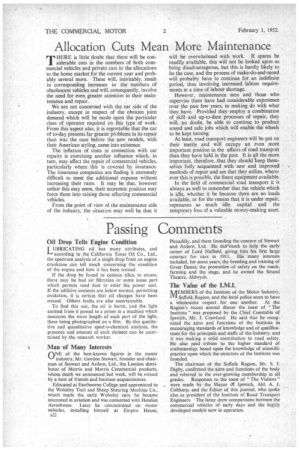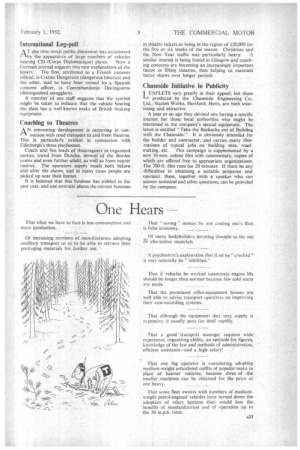Passing Comments
Page 24

Page 25

If you've noticed an error in this article please click here to report it so we can fix it.
Oil Drop Tells Engine Condition
LUBRILUBRICATING oil has many attributes, and CATING to the California Texas Oil Co., Ltd., the spectrum analysis of a single drop from an engine crankcase can tell much concerning the condition of the engine and how it has been treated.
If the drop be found to contain silica to excess, there may be bad air filtration or some loose part which permits road dust to enter the power unit. If the additive contents are below normal, permitting oxidation, it is certain that oil changes have been missed. Others faults are also ascertainable.
To find this out, the oil is burnt, and the light emitted from it passed to a prism in a machine which measures the wave length of each part of the light, these being photographed on a film. By this qualitative and quantitative spectro-chemical analysis, the presence and amount of each element can be ascertained by the research worker.
Man of Many Interests '
ONE of the best-known figures • in the motor industry, Mr. Gordon Stewart, founder and chairman of Stewart and Ardern, Ltd., the London distributor of Morris and Morris Commercial products. whose death we announced last week, will be missed by a host of friends and business acquaintances.
Educated at Eastbourne College and apprenticed to the Wolseley Tool and Sheep Shearing Machine Co., which made the early Wolseley cars, he became interested in aviation and was connected with Hendon Aerodrome. Later he concentrated on motor vehicles, installing himself at Empire House, A22 Piccadilly, and there founding the concern of Stewart and Ardem, Ltd. He diemuch to help the early career of Lord Nuffield, giving him his first large contract for cars in 1911. His many interests included, for some years, the breeding and training of Great Danes, the promotion of safety on the roads, farming and the stage, and he owned the Strand Theatre, Aldwych.
The Value of the I.M.I.
'MEMBERS of the Institute of the Motor Industry, "I Suffolk Region, and the local police seem to have , a wholesome respect for one another. At the Region's recent annual dinner the toast of "The Institute" was proposed by the Chief Constable of Ipswich, Mr. J. Crawford. He said that he recognized the aims and functions of the Institute in encouraging standards of knowledge and of qualifications for the principals and staffs of the industry, and it was making a solid contribution to road safety. He also paid tribute to the higher standard of craftmanship, based upon the knowledge of scientific practice upon which the•structure of the Institute was founded.
The chairman of the Suffolk Region, Mr. S. J. Digby, confirmed the aims and functions of the body and referred to the ever-growing membership in all grades. Responses to the toast of "The Visitors" were made by the Mayor dr Ipswich, Ald. A. J. Colthorp, and the Editor of this journal, who spoke also as president of the Institute of Road Transport Engineers. The latter drew comparisons between the commercial vehicles of early days and the highly developed models now in operation.
International Leg-pull
A T one time much public discussion was occasioned by the 'appearance of large numbers of vehicles bearing CD '(Carps Diplomatique) plates. Now a German journal suggests two new explanations of the
letters: The first, attributed to a French customs official, is Cretins Darigereux (dangerous hmatics) and the other, said to have been coined by: a Spanish customs officer, is Contrabandistas Distingueros (distinguished smugglers).
A member of our staff suggests that the symbol might be taken to indicate that the vehicle bearing the plate has a well-known make of British braking equipment. •
Coaching to Theatres
AN interesting development is occurring in connection with road transport to and from theatres. This is particularly evident in connection with Edinburgh's three playhouses.
Coach and bus loads of theatregoers. in organized parties, travel from Dundee, several of the Border toWnS and even further afield, as well as from nearer centres. The operators supply meals both before , arid. after the shows, arid in many cases people are picked up near their honies.
It is believed that this business has trebled in the past year, and one estimate places the current business in theatre tickets as being in the region of £20,000 for the five or six weeks of the season. Christmas and the New Year traffic was particularly heavy. A similar interest is being found in Glasgow and coaching concerns are becoming an increasingly important factor in filling _theatres, thus helping to maintain • better shows over longer periods.
Chaseside Initiative in Publicity
EAFLETS vary greatly in their appeal; but those produced by the Chaseside Engineering Co., Ltd., Station Works, Hertford, Herts, are both interesting and attractive.
A year or so ago they devised one having a specific interest for those local authorities who might beinterested in the company's special equipment. The latest is entitled "Take the Backache out of Building with the Chaseside." It is obviously intended for the builder and contractor, and carries many illustrations of typical jobs on • building sites,roadmaking. etc. This campaign is supplemented by a new 16-mm. colour film with commentary, copies of which are offered free to appropriate organizations. The 700-ft. film runs for 20 minutes. If there be any difficulties in obtaining a suitable projector and operator, these, together with a speaker who can answer technical and other questions, can be provided by the company.
























































































